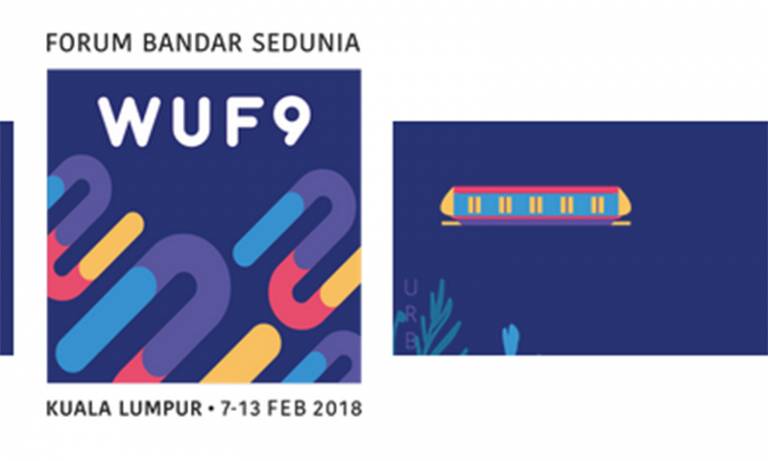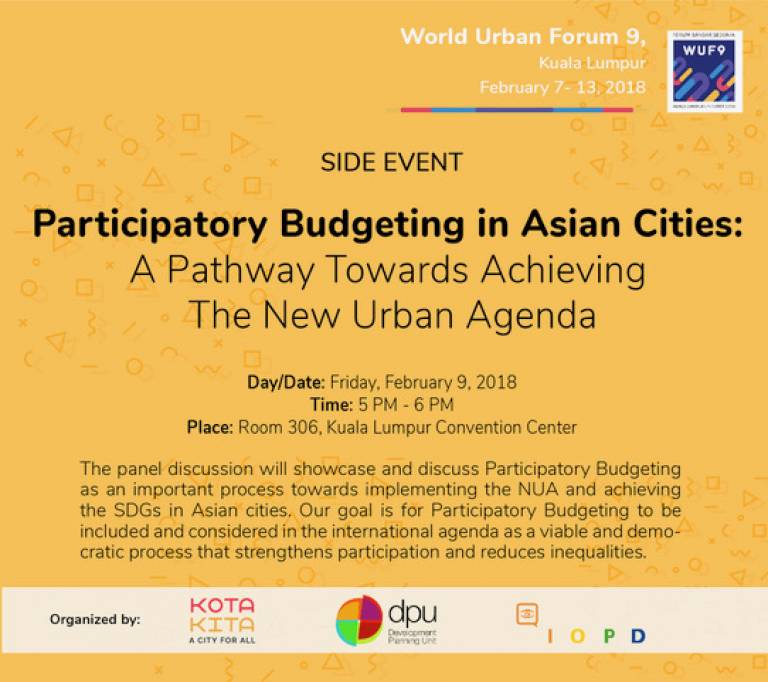DPU participation at the 9th World Urban Forum
19 January 2018

The DPU will have a presence at the Ninth World Urban Forum (WUF) in Kuala Lumpur between 7th-13th February.
The Ninth Session of the World Urban Forum will be the first session to focus on the implementation of the New Urban Agenda adopted in Habitat III. WUF9 will be instrumental to substantively feed into the inputs for the first report of the implementation of the New Urban Agenda.
DPU Emeritus Professor, Yves Cabannes, will be hosting an event on 'Participatory Budgeting in Asian Cities' with DPU alumni Ahmad Rifai from Kota Kita Foundation [Indonesia], as well as a further event on 'Scaling up participatory budgeting for fostering resilience of urban and regional development' as well as two further ones: a networking session 'Scaling up participatory budgeting for fostering resilience of urban and regional development’ and a training on ‘ Engendering PB: how to generate more gender sensitive PB. Learning from experience
In addition the DPU's Julian Walker will also be in attendance, and will be arranging a DPU Alumni dinner on 10th February. If you are a DPU alumni and will be at WUF in Kuala Lumpur, please contact Julian by email at julian.walker@ucl.ac.uk by the 6th Feb.
DPU events
DPU's Julian Walker will be a panellist for this event.
- 1. OFFICIAL SIDE EVENT Participatory Budgeting in Asian Cities: A Pathway Towards Achieving The New Urban agenda
Organizers: Kota Kita Foundation (Indonesia), coordination/ The Bartlett Development Planning Unit, University College London (United Kingdom) / International Observatory on Participatory Democracy (International)
Moderator: John Taylor, National Urban Poverty Reduction Program - UNDP Bangladesh
Commentator/Rapporteur: Yves Cabannes,The Bartlett Development Planning Unit - University College London
Speakers:
- Ahmad Rifai, Kota Kita Foundation [Indonesia]
- Shariza Kamarudin, Gender Responsive & Participatory Budgeting, Penang Women’s Development Corporation [Malaysia]
- Vladimir Vagin, Ministry of Finance, Financial Research Institute [Russia]
- Lev Shilov, European University at St. Petersburg [Russia]
- Ming Zhuang, Chengdu HuiZhi Participation Center [China] - TBC
- Adrià Duarte, International Observatory on Participatory Democracy [International]Practical information
Day/Date: Friday, February 9, 2018
Time: 5 PM - 6 PM
Place: Room 306, Kuala Lumpur Convention Center
- 2. NETWORKING EVENT: “Scaling up participatory budgeting for fostering resilience of urban and regional development'
Partners involved in the organization of the Networking Event: African Local Governments Academy (ALGA) ; Authority for the Promotion of Participation of Tuscany Region; Center for Social Studies of Coimbra University (CES); Development Planning Unit of UCL (DPU) ; Kota Kita – A city for All; Local Initiatives Support Program – Russia (LISP and WB Russia Country Office) ; Secretariat of the International Observatory of Participatory Democracy (OIDP), Swedish Association of Municipalities and Regions (SALAR).
Time and location - Sunday 11 February from 15:00 to 17:00 in room 405 at the venue of the Forum, Kuala Lumpur Convention Center.
Since the first experiences in Brazil, Participatory Budgeting has spread worldwide, proving to be one of the best device for involving citizens in decision-making about public policies and projects. Actors such as State institutions, international multilateral entities, associations of mayors, civil society organizations, universities, technical and financial partners are committed to increase its use. The session will focus on different mechanisms through which significant scaling up is being attained through: [a] massive mobilization and advocacy from civil society organizations; [b] National organizations of cities and local governments; [c] National laws or Metropolitan decrees turning PB into a compulsory and regulated practice; [d] large international aid supported national PB program and [e] initiative at Central Government level. The results of these different mechanisms for “scaling-up” are very suggestive and inspiring that need to be exchanged and reflected upon. As a whole, they highlight a huge potential to integrate and complement the local experiences, dealing in a more efficient way with broader issues than those faced at municipal or infra-municipal level, and incentivizing the consolidation of a stronger participatory culture. The adaptation of the device to the new scope has visible effects on learning practices, the use of Information and Communication Technologies and the issues related to social inclusion and demo-diversity of participants. In a world which counts today more than 3,500 Regional and Local Authorities committed to the concrete implementation of Participatory Budgeting, this networking event wish to provide opportunities to share tools and approaches to scale up participatory budgeting as a way of improving resilience of local territories and the sharing of governance innovations from our cities and regions. The overall session’s objective is to point out significant and practical ways and means to attain the SDGs through the scaling up of PBs at global level.- 3. SIDE EVENT: Social Production of Habitat: Building the African Case in the Implementation of the New Urban Agenda
Date: 11 February, 2018
Time: 17:00-18:00
Venue: Room 410,
Kuala Lumpur Convention Center
People build, people shape cities.
The notion of social productions of habitat refers to a process whereby a network of stakeholders collectively determines the productions and or improves the conditions of their own habitat (dwelling place and living environment). The process of social production of habitat is characterized by a large measure of voluntary action and people’s agency. New Urban Agenda highlights important urban challenges and questions that contemporary cities are grappling with, such as how to plan and manage cities, towns and villages for sustainable development. A key Sustainable Development Goals relatable to this event is "Make cities and human settlements inclusive, safe, resilient, and sustainable. This event on the social production of habitat will generate and impart evidence based knowledge instrumental in improving practice of social production of habitat in the African context. We strongly believe that policymakers need to address key barriers to social production on habitat. There is need to improve legislation to make implementation rules clearer and more explicit, particularly around delivery mechanisms. The event will contextualise the social production of habitat for the African context by bringing civil society actors, academics, activists, practitioners, local government officials and political figureheads into a serious debate about these issues.- 4. TRAINING EVENT: How to generate more gender sensitive participatory budgeting. Learning from local experience
Participatory Budgeting has been expanding over the last 30 years, from one experience to over 3000 in 2017. Despite its huge contribution to participatory democracy and improvement of citizen’s well being, PB has largely been unable to address gender inequality and modify men-women social relations patterns. This being said some experiences have been able to reach significant changes and to introduce innovative methodologies. The event is structured into three main parts:
1. The first 80 minutes focus on how gender equity approaches were successfully inserted in PB processes in different cities of different scales: Key obstacles found during processes? How were they addressed? What were the outcomes? are the core issues presented by trainers and actors who were directly involved in local processes in cities from Brazil, Cameroon, Indonesia Malaysia, Madagascar and Portugal [tbc]. The obstacles still remaining will be highlighted for the participants to reflect upon and kick off debates.
2. A 20 minutes debate and Q&A will end up with a list of constraints and positive lessons coming from this “learning by doing” exposure on how to generate more gender sensitive participatory budgeting.3. Third part of the training stimulates direct involvement of and proposals from participants who will work in small groups [40 minutes] on a concrete and specific case on how do foster Gender sensitive PB, that at the same are empowering women, meeting their expectations and change men-women roles. Trainers will provide the socio- economic-cultural characteristics of the case. During the last 20 minutes, groups participants will share their results in plenary and some of the trainers who have been directly involved in experimenting Gender sensitive PB will give final comments.
Other events
In addition, there are a number of events being held at WUF that are organised by DPU associates and members of our network.
- Networking event: Making cities work for babies, children, youth and girls
- Partners: Arup (lead), Plan International, Bernard Van Leer Foundation, City of Tel Aviv-Yaafo, University of Canberra, 8 80 Cities, World Urban Parks, 100 Resilient Cities pioneered by the Rockefeller Foundation
Time and venue: Saturday 10 February from 3:00-5:00 PM. Location: Room 403 at the venue of the WUF, Kuala Lumpur Convention Centre
How do we make our cities work for children? We invite the participation of urban planners, child-rights organisations, local governments, funders and children themselves. A participatory workshop and panel discussion will identify actions and strategies, as well as share tools to make cities more child-friendly. The event will be speaking directly to implementation (of the NUA) and achievement of SDG 11 by getting panel insights into key issues, tools, actions, funding and partnerships. We aim to achieve an understanding of children’s perspective on urban development, consensus on actions needed and new types of partnerships. The workshop will bring together inputs from audience including children, youth and girls, and will co-create a strategy designed by children for children in cities. It will be structured to focus on bringing out actions in areas of Health & Well-being, Community & Economy, Infrastructure & Environment and Leadership & Strategy. This structure is based on the City Resilience Index, developed by Arup supported by the Rockefeller Foundation. - Side event: The role of urban governance in resilience building – perspectives, tools and processes for governing a resilient urban future
Partners: Arup (lead), 100 Resilient Cities pioneered by the Rockefeller Foundation, The Bartlet Development Planning Unit (DPU) University College of London (UCL)
Time and venue: Friday 9 February from 2.00-3:00PM. Location: Room 409 at the venue of the WUF, Kuala Lumpur Convention Centre
Short description: How cities’ governance issues influence – positively or negatively – the design, delivery and implementation of a tangible, practical and relevant city resilience strategy? Drawing from the experience and findings of the work developed within the 100 Resilient Cities (100RC) and City Resilience Index (CRI) initiatives, this participatory event will discuss governance challenges and enablers to implement a resilient urban development, especially in complex socio-political and economic contexts. The participation and contribution of city leaders will enrich the debate with their direct experience.- Side event: Global models for safe and secure homes: learning from World Habitat Award winners
8th February; 11:30am-12:30pm in room 406
Representatives of the winning projects Mutual Housing at Spring Lake (USA) and Post-Haiyan Self-Recovery Housing Programme (Philippines) will share how their housing solutions have had a life-changing impact on the communities they work in.
Please see attached document for more information
 Close
Close

